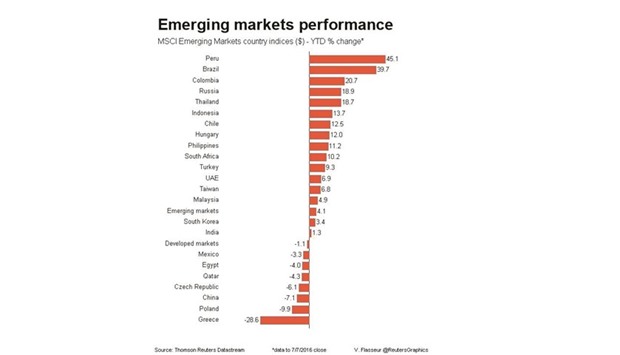Emerging stocks retreated yesterday and were set to end the week down almost 2%, whilst the yuan faced its fifth straight week of decline against the dollar, its longest losing streak in seven months.
The benchmark emerging equity index was down 0.3% after weak performance in Asia set the tone for European trading.
Among the biggest fallers in Asia were Chinese mainland stocks, which lost 0.9%, and Hong Kong, down 0.7%, whilst in Europe, Russian dollar-denominated shares lost 0.7% and Turkish stocks slipped 0.8%.
Investors have stepped back before US non-farm payrolls data.
The consensus is for a gain of 175,000 jobs in June according to a Reuters poll, but the previous month’s negative surprise has made markets wary.
“If we see another weak print, especially an even bigger downside surprise than the miserable 38,000 recorded last month, then the risk-off mood that prevailed at the start of the week is likely to return with a vengeance,” Rabobank analysts said.
On the flip side, a strong number could renew speculation about a US rate increase this year, triggering dollar strength and punishing emerging assets.
The yuan is already under pressure, with bets against the Chinese currency hitting a five-month high in the last two weeks on expectations it will be allowed to weaken further to support the world’s second-largest economy. “They will continue to devalue, everyone is in the same game, the race to the bottom,” said Mahesh Bhimalingam, global head of emerging markets credit strategy at BNP Paribas.
The yuan has declined almost 0.5% over the past week, and is set for its fifth straight weekly loss, its longest losing streak since mid-December.
Other currencies such as the South African rand, Turkish lira and Russian rouble benefited from a weaker dollar, gaining 0.2-0.4%.
The Hungarian forint firmed a touch against the euro, trading at its strongest level in two weeks on hopes the sovereign credit rating could be raised to investment grade by Moody’s after close of business on Friday.
Better-than-expected foreign trade surplus numbers for May added to the upbeat mood.
However, some analysts struck a note of caution, given Britain’s vote to exit the European Union has added to uncertainties about growth in central and eastern Europe.
“There had been a high likelihood of Moody’s following Fitch and upgrading Hungary to investment grade at today’s review; but this appears unlikely in view of Brexit uncertainties, which is making policymakers revise forecasts lower,” Commerzbank analysts said in a note.
The Polish zloty has weakened around 0.5% against the euro this week, and was flat on the day.
But Brexit has driven developed market yields even lower, spurring inflows to higher-yielding alternatives.

EMERGING
